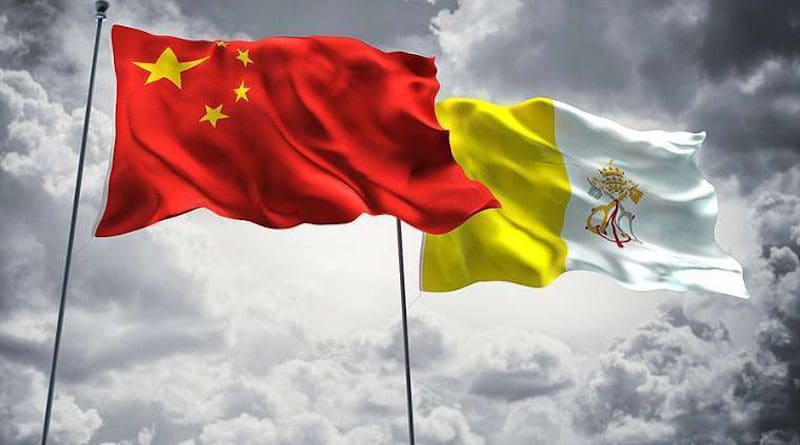Has The Vatican Lost Its Voice In China? – Analysis
By Fredrik Fällman*
2020 ended on a sad note for China–Vatican relations. News emerged on 30 December that two nuns from the unofficial Vatican office in Hong Kong were detained for three weeks in Hebei in May 2020. They were not allowed to return to Hong Kong and likely remain under house arrest.
Most Catholic clergies — likely fearful of breaking the new Hong Kong national security law — did not speak openly about the case. The only exception was Cardinal Joseph Zen Ze-kiun, Archbishop of Hong Kong between 2002 and 2009, who has been among the harshest critics of Vatican China policy for many years.
This is a sign that the increased pressure from Beijing and subsequent limitation of Hong Kong’s relative openness are reaching the Catholic Church, which may be symbolic of Sino-Vatican relations more generally. The Church has a broad presence in Hong Kong society through schools and charitable institutions. Many leading persons are Catholics — including former and current chief executives Donald Tsang and Carrie Lam.
The Hong Kong Catholic diocese is facing multiple challenges, especially since it has been without a bishop since 2019. The impending choice of a new one will undoubtedly create more tensions as he will be scrutinised for where his allegiance lies. The choice of a ‘pro-Beijing’ bishop will not go down well among many Hong Kongers, while the choice of a more independent and critical bishop may put pressure on Hong Kong Catholics.
If the Vatican wants to restore the order of episcopal appointments and do away with clandestine practices, then it must engage in dialogue with any necessary counterpart — ‘pro-Beijing’ or not. But dialogue on equal terms is not what is happening. In the ‘pastoral guidelines of the Holy See concerning the civil registration of clergy in China’ published in 2019, the Holy See recognises that ‘many pastors remain deeply disturbed’ by the Chinese system.
While the guidelines ask for ‘no intimidatory pressures’ to be put on unregistered Catholic communities, they also ask for compliance with Chinese regulations. But if registration procedures do not ‘appear respectful of the Catholic faith’, priests and bishops are asked to first state their faithfulness to Catholic doctrine in writing or orally to a witness before complying.
The guidelines seem to be a way to keep up an appearance of integrity, while in reality, they are a compromise and a concession. How can the Church proceed when the situation for openly practised religious life is deteriorating?
In 2018, all registered religious organisations in China published their five-year plans for ‘Sinicization’. The purpose is supposedly to adapt to Chinese culture, but they focus on adapting to and following the leadership of the Chinese Communist Party (CCP). Sinicization is the latest attempt in the drive to ‘adapt religion to socialist society’, a policy started in the 1990s under Jiang Zemin.
The CCP is increasingly claiming the right to interpretation of what is ‘Chinese’ in all contexts, adding Chinese characteristics to everything from the market economy to theology to human rights. China’s constitution only protects ‘normal religious activity’, leaving religious groups in constant doubt as to whether their actions are normal or not.
Vatican representatives described the Provisional Agreement between the Holy See and China in 2018 as ‘a genuinely pastoral agreement’. After prolonging the agreement in October 2020, the Holy See acknowledged that the agreement was ‘not perfect’ but still ‘a step forward’.
French Jesuit and Fudan University Professor Benoit Vermander has discussed the dangers of excluding China from the world community and argues for finding a way where dialogue and criticism can co-exist. Vermander is right that dialogue is essential, but is there really any dialogue between the Holy See and China?
The Catholic Church often comments on the situation in other countries. Yet in China, the Vatican keeps silent on many concerning developments — including structural religious persecution, labour rights issues and human rights abuses against the Uyghurs. It seems Vatican officials are holding China to a different standard compared to other countries.
China should be treated like any other country and play by the same rules as others. With increasing Chinese influence on the world scene, there is a risk that ‘Chinese characteristics’ may be applied outside China, twisting and turning universal values and principles.
There needs to be an international coalition between Christians, and perhaps other religious groups, to put pressure on China. Here the Vatican could play a central role with its strength and experience, which would also benefit the achievement of the ‘pastoral’ aspects sought with the current Sino-Vatican agreement. True dialogue includes frank criticism and is the key to making real steps forward in relations with China.
*About the author: Fredrik Fällman is Associate Professor of Sinology at the Department of Languages and Literatures, University of Gothenburg, Sweden.
Source: The article was published by East Asia Forum

